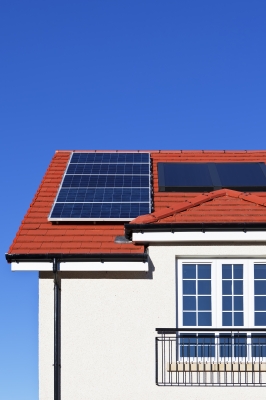It’s a no-brainer, right? We all know that green is the thing! With Hawaii’s goal of becoming energy independent, you’d think that adding panels that create energy using the power of the sun would be a no-brainer. Let’s review.
Photo courtesy of Serge Bertasius Photography
Photovoltaic panels create energy that can either be “sold” back to HELCO or stored on-site. Purchasing a system can be expensive. For this reason, some homeowners choose leased systems.
Pros to Leasing
- Low initial outlay
- Free maintenance during the lease
- Affordable monthly payments
Cons to Leasing
- Homeowners are not normally afforded the benefit of the tax credits
- Owners are solely at the mercy of the leasing company for repairs
Complications During the Loan Process
REALTORS® normally regard a PV system as a huge selling point, though it was a shock to learn how much PV systems can complicate the loan process. Examples:
- When it comes to lending, the universal requirement is that there needs to be connection to a conventional source of power.
- In qualifying a buyer, government-guaranteed and insured loans treat debt related to the purchase or lease of PV systems differently. Apparently payments for a leased system do not impact a buyer’s ability to qualify (*see explanation below).
- This is not the case when a buyer assumes payments for a purchased system.
- In some cases, government loans may regard the cost of the system as a concession. Concessions are limited on any loan program these days.
- When a system is owned, most appraisers absolutely give it value. Not so with leased systems.
- The one variation regarding a conventional source of power back-up is when off-grid is common to the area. A back-up system will still probably be required.
*Lease payments with conventional loans (other than government backed VA, FHA, USDA) are part of the qualifying ratio, so they are included in qualifying ratios just like car or credit card payments. Leases also must be a fixed payment for a fixed period of time and a production guarantee is required unless there is a power purchase agreement based on usage. In this case, the payment is treated as a utility payment and not included as part of the buyer’s ability to qualify.
Another potential hiccup that could surface is that, though one could incur an insurance surcharge on the system, a third party vendor cannot be named as a loss payee or named insured on the property insurance policy. The vendor will also need to agree to termination and removal of the panels if the property is foreclosed.
Remember, a financed system may also become an encumbrance on title that will likely need to be cleared or re-subordinated upon sale.
Confused?
Me too! For now, one thing is for sure. If you are buying a home with a PV system, get your lender involved early on. Linda Wong, at Island Mortgage Source (969-9988) has a much better understanding of the issue and provided invaluable assistance with this information.
What I do know, for now, is that even with the best of intentions, going GREEN isn’t always as easy as you might think!


Tanya Sunshine
October 9, 2015
Great article, Denise!
Thanks for explaining the potential complications of homeowners getting into a leased PV system.
Tanya Sunshine
October 9, 2015
Great article, Denise!
Thanks for explaining the potential complications of homeowners getting into a leased PV system.